- Blog
- Industry Leaders Security Rankings: Banking Edition
Does your bank allow you to easily use strong and unique passwords? Following an end user research-driven approach, we recently set out to answer that question. We narrowed our research list to the top 5 banks in the United States ranked by assets held, which we identified as:
Bank of America
Citi
JPMorgan Chase
U.S. Bank
Wells Fargo
From there, we determined criteria to evaluate password security friendliness, tested the criteria, and now present the findings with a numerical grading system.
Financial data, like other personally identifiable information such as social security numbers in the U.S., is incredibly sensitive. As consumers can attest, banking password breaches can lead to disruptive inconvenience at best and life-alerting financial loss at worst. The U.S. government has taken note.
In November 2021, U.S. banking regulators ordered banks to report ‘cybersecurity incidents’ to their primary government regulator within 36 hours. It’s likely that the parade of high-profile data breaches - JPMorgan Chase in 2014; Capital One in 2019 - helped propel this rule forward.
While it’s impossible for us individually to control cyber criminal behavior, we can control our password practices. One of the best strategies for protecting your financial information is utilizing a strong and unique password and leveraging other tools such as password managers, authenticator apps, and security keys to further enhance security. Of course, banks need to enable use of these tools as well. Read on to find out whether they’ve done so.
Ranking Criteria
The criteria used to assess password security are:
Does the bank allow passwords that are at least 40 characters?
Experts advise passwords be strong and unique, with strength being best determined by long, random passwords. In our note on How secure is my password we share: "Short passwords are far more susceptible to a brute force attack, where a computer or malicious software program goes through every 8-digit combination (or more) of characters until it finds a match."
For the purpose of this exercise, we’re specifically evaluating whether organizations allow users to create passwords that are at least 40 characters - a number we settled on because passphrases, which are increasingly popular, tend to be quite long. Plus, password managers - which help people generate, store, and manage passwords - can generate much longer passwords for enhanced security that may exceed the limit.
Does the bank allow users to paste and autofill passwords?
This is a good thing. Password pasting enables the use of password managers, and autofill enables fast and easy logins.
Does the bank offer two-factor authentication (2FA)?
This is a good thing. As we’ve said time and time again, two-factor authentication is more secure than simply using a username and password.
Does the bank allow authenticator apps?
Does the bank allow authenticator hardware?
These are both good. Authenticator apps and hardware add extra levels of strong protection and are more secure than SMS text messages.
Does the bank send an email informing the user of a password reset?
Does the bank require the user to log in again using the new password?
These are both practical steps. It’s prudent to alert users to a password change they may not have authorized. Requiring them to log in again is a security best practice.
Password Security Scoring System
The assessment includes a grade for each bank. To determine the grade, we assigned either ✅ (yes) or ⛔ (no) to the seven questions articulated above. For example, 7/7 is a perfect score, or 100% (sadly, no bank received a perfect score!). A 5/7 is 71%, which is defined as Fair.
Below is a simple guide to the grading. Below that, you’ll see the grades for each bank.
Grading Guide
85-100%: Good
71-84%: Fair
0-70%: Room for Improvement
Bank of America
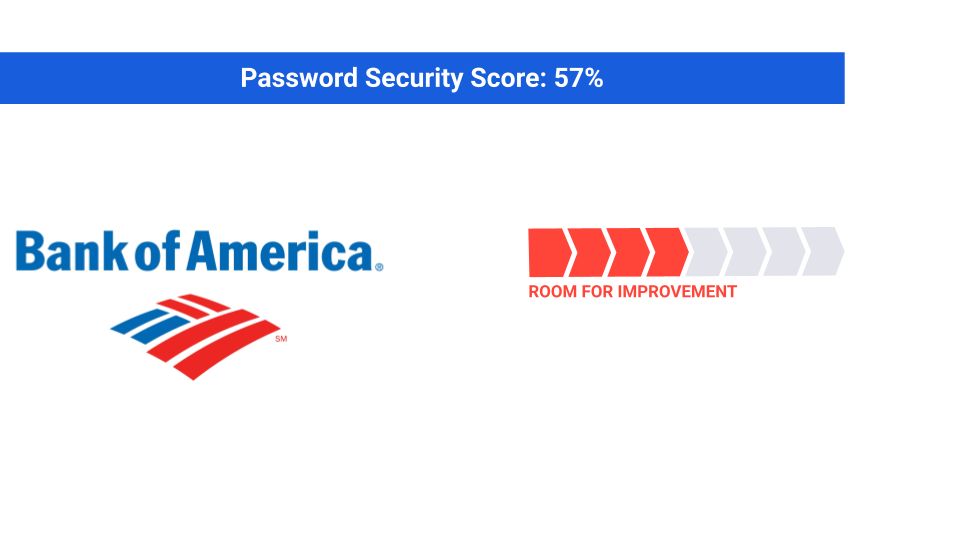
Bank of America receives a Room for Improvement rating because it sets a password length limit between 8-20 characters. The system does not allow for use of authenticator apps or authenticator hardware. On other fronts, it is in line with best practices.
Password Security: Room for Improvement
⛔ Does not allow passwords ≥ 40 characters
✅ Allows users to paste passwords
✅ Offers two-factor authentication
⛔ Does not allow authenticator apps
⛔ Does not allow authenticator hardware
✅ Informs users of password reset
✅ Requires login using new password
PASSWORD SECURITY SCORE: 57%
Citi
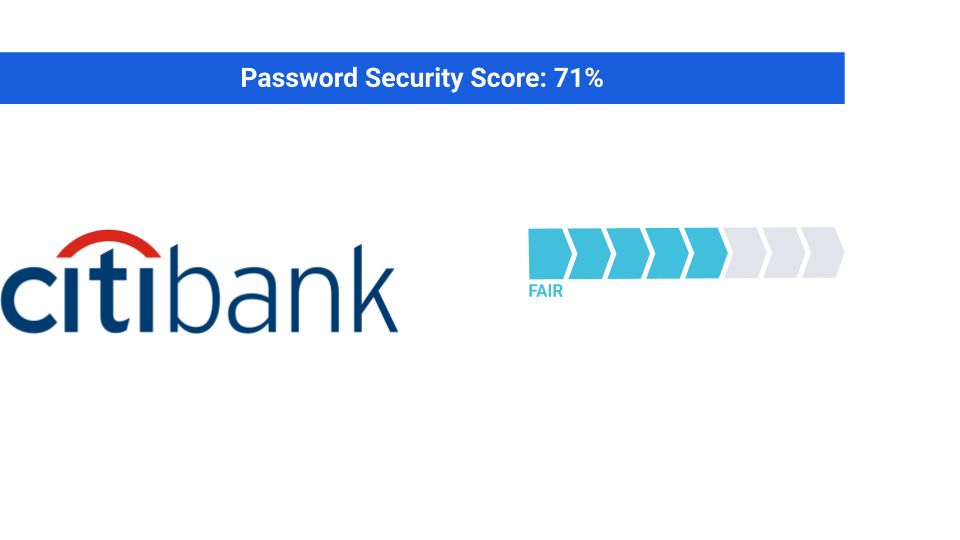
Citi fares better than Bank of America as it does not limit password length, and users can leverage authenticator hardware. Authenticator apps, however, are not an option.
While it informs users of a password reset, Citi does not require users to login again using the new password.
Password Security: Fair
✅ Allows passwords ≥ 40 characters
✅ Allows users to paste passwords
✅ Offers two-factor authentication
⛔ Does not allow authenticator apps
✅ Allows authenticator hardware
✅ Informs users of password reset
⛔ Does not require login using new password
PASSWORD SECURITY SCORE: 71%
Chase
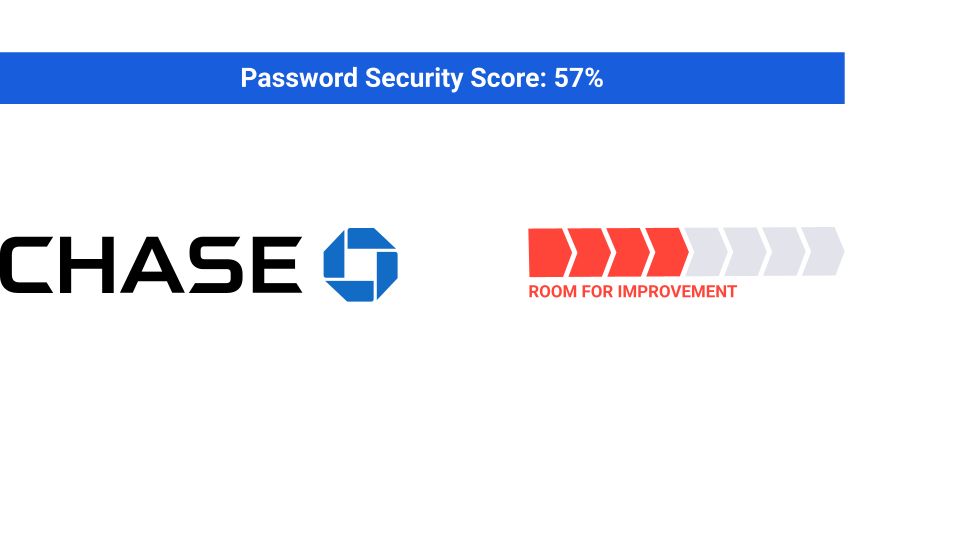
Chase errs in limiting password length. The other area where it falters - similar to its competitors - is in the authenticator app and authenticator hardware arena.
Perhaps Chase will lead the way on the authentication front. Or, will Wells Fargo beat Chase to it?
Password Security: Room for Improvement
⛔ Does not allow passwords ≥ 40 characters
✅ Allows users to paste passwords
✅ Offers two-factor authentication
⛔ Does not allow authenticator apps
⛔ Does not allow authenticator hardware
✅ Informs users of password reset
✅ Requires login using new password
PASSWORD SECURITY SCORE: 57%
US Bank
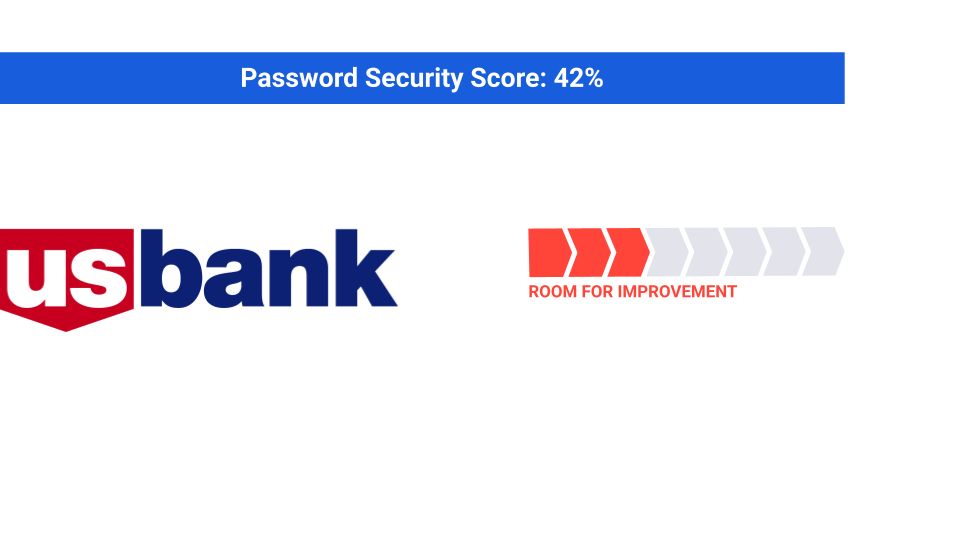
US Bank comes in with the lowest percentage score, faltering in four categories. While the fundamentals are there - pasting, 2FA, informs users of password reset - it has some work to do and limits password length between 8-24 characters.
Password Security: Room for Improvement
⛔ Does not allow passwords ≥ 40 characters
✅ Allows users to paste passwords
✅ Offers two-factor authentication
⛔ Does not allow authenticator apps
⛔ Does not allow authenticator hardware
✅ Informs users of password reset
⛔ Does not require login using new password
PASSWORD SECURITY SCORE: 42%
Wells Fargo
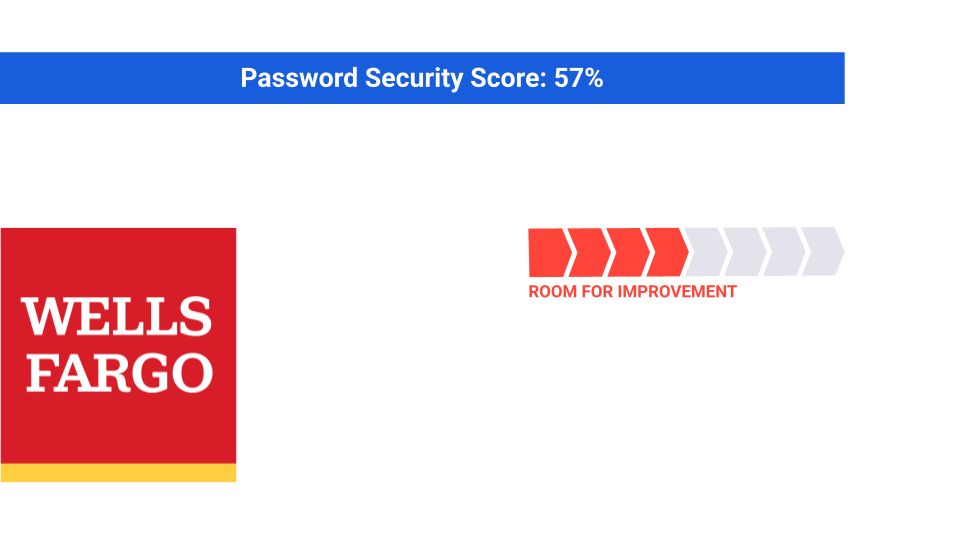
Wells Fargo unfortunately makes a couple fundamental mistakes by limiting password length to 8-32 characters and not requiring users to login again after changing their passwords. Otherwise, Wells Fargo has taken a step forward with its approach to authentication hardware.
Password Security: Room for Improvement
⛔ Does not allow passwords ≥ 40 characters
✅ Allows users to paste passwords
✅ Offers two-factor authentication
⛔ Does not allow authenticator apps
✅ Allows authenticator hardware
✅ Informs users of password reset
⛔ Does not require login using new password
PASSWORD SECURITY SCORE: 57%
Conclusion
There are a few patterns to note. First, all of the banks on this list allow pasting of passwords. This means that there is no good excuse to avoid using a password manager. If you are using a password manager or interested in getting started, read more on Five Best Practices for Password Management.
Next, it’s clear (and admirable) that 2FA has gone mainstream! If you haven’t already, we strongly encourage you to enable it. For more on 2FA, check out “Top 10 burning questions on 2FA”. We’re also happy to see that users are informed when their password is reset. From a security perspective, this is an easy no-brainer.
While this criteria isn’t exhaustive, it gets to the heart of how businesses can enable strong password security. And, we hope it gives you a sense of how your bank is performing, whether you need to enhance your password security with some of the capabilities offered, or even whether you need to find a new bank.
So, how did your bank perform? Follow Bitwarden on Twitter and let us know.
Get Started with Bitwarden
Ready to get started with a password manager today? Quickly get set up with a free Bitwarden account, or sign up for a 7-day free trial of our business plans so your business and colleagues can stay protected.
Industry Leaders Security Rankings Series
Catch up on the rest of the series to see how the top companies in the following industries fair when it comes to allowing consumers to utilize strong passwords: